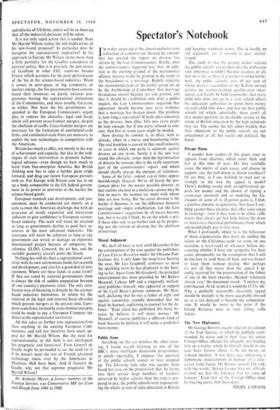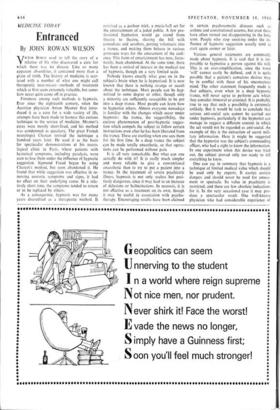Britain has much to offer, not merely in the way
of achievement and capacity, but also in the tech- niques of state intervention to promote techno- logical advance—even though we have much to learn from free-enterprise America. But British thinking now has to take a further giant stride forward, and drag our future European partners with us. For Europe with Britain now has to set up a body comparable to the US federal govern- ment in its power to intervene in the market for science-based goods.
Spectator's Notebook
M rather surprised at the almost exclusive con- I of comment on 'divorce by consent' that has greeted the report on divorce law reform by the Law Commissioners. Briefly, what the commissioners suggested was that, in addi- tion to the existing ground of the matrimonial offence, divorce might be granted in the event of the breakdown ot a marriage. Rightly rejecting the recommendations ot the earlier group set up by the Archbishop of Canterbury that marriage breakdown should become the sole ground, and that it should be established only after a public inquest, the Law Commissioners suggested that separation should become ipso facto evidence that a marriage has broken down. The problem is, how long a separation? If both sides consented to the divorce, then (they felt) two years might be long enough; but if one party refused to con- sent, then five or seven years might be needed.
Now divorce by consent is, in effect, with us already, albeit in a messy and humiliating form. The real hardship is caused in that small minority of cases in which one party is adamant against divorce on any terms. Surely it is the new way round this obstacle, rather than the legitimisation of divorce by consent, that is the really important part of the commissioners' report, and which should chiefly engage the energies of reformers. and keeping standards down. This is hardly an old argument, yet it seemed to pass unchal- lenged.
The truth is that by paying higher salaries the public schools attract men into the profession who otherwise wouldn't become teachers at all; that in so far as there is a teacher-training bottle- neck, the public schools, over 60 per cent of whose masters (according to the Kalton survey) possess no teacher-training qualification what- soever, can hardly be held responsible; that every child who does not go to a state school allows the education authorities to spend more money on each child who does; and that the best public schools (of which, admittedly, there aren't all that many) perform an invaluable service to the whole of British education by the high standards they set. The sooner the left admit frankly that their objections to the public schools are not educational at all, but social and political, the better.
Private Punk
I wonder how readers of this paper react to appeals from charities, which come thick and fast at this time of year. Do they carefully assess the merits of each cause, and choose to support, say, the half-dozen or dozen worthiest? Or are they, as I am, inclined to react just as strongly to the way the appeal is made? There's nothing wrong with straightforward ap- peals for money and the chance of signing a seven-year covenant and so mulcting the Ex- chequer of some of its ill-gotten gains is, I find, a positive stimulus to generosity. Nor have I any- thing against those charities that offer some token in exchange—even if they tend to be either raffle tickets that always get lost long before the draw or tickets to a theatrical performance from which one would gladly pay to stay away.
Entranced
By JOHN ROWAN WILSON































 Previous page
Previous page